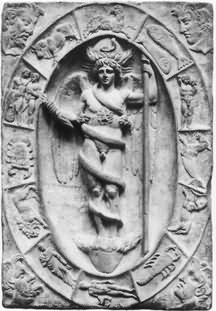
PHANES

Phanes emerging from the Cosmic Egg
From The Hymns of Orpheus
To Protogonus
Or the First-Born
O Mighty first-begotten, hear my pray'r,
Two-fold, egg-born, and wand'ring thro' the air,
Bull-roarer, glorying in thy golden wings
From whom the race of Gods and mortals springs.
Ericapæus, celebrated pow'r,
Ineffable, occult, all shining flow'r.
From eyes obscure thou wip'st the gloom of night,
All-spreading splendour, pure and holy light
Hence Phanes call'd, the glory of the sky,
On waving pinions thro' the world you fly.
Priapus, dark-ey'd splendour, thee I sing,
Genial, all-prudent, ever-blessed king,
With joyful aspect on our rights divine
And holy sacrifice propitious shine.
1. A mystic divinity in the system of the Orphics, is also called Eros, Ericapaeus, Himerus Metis, and Protogonus. He is said to have sprung from the mystic mundane egg, and to have been the father of all gods, and the creator of men.
Phanes means "Manifestor" or "Revealer," and is related to the Greek words "light" and "to shine forth."
Phanes, or the personification of longing love, is first mentioned by Hesiod (Theogony 201), where he and Eros appear as the companions of Aphrodite. He is sometimes seen in works of art representing erotic circles; and in the temple of Aphrodite at Megara, he was represented by Scopas, together with Eros and Pothus. This ancient bas relief shows Phanes emerging from the Cosmic Egg, surrounded by the four winds and the twelve signs of the zodiac. It is located in the Galerie e Museo Estense, Modena, Italy.
As "light" or a Protogonus - "first-born" - he was the primeval deity of procreation and the generation of new life; his other names included Ericapaeus ("power") and Metis ("thought"). He is often equated with Eros and Mithras and has been depicted as an hermaphroditic deity emerging from a cosmic egg, entwined with a serpent.
Phanes was believed to have been hatched from the World-Egg by
Chronos and Aether. He was the ruler of the gods and passed
the sceptre of kingship to his daughter Nyx, who later gave it to her son Ouranos.
2. A mystic divinity in the system of the Orphics, is also called Eros, Ericapaeus, Metis, and Protogonus. He is said to have sprung from the mystic mundane egg, and to have been the father of all gods, and the creator of men.
From The Theogony of Hesiod
"And with her went Eros, and comely Desire followed her at her birth at the first and as she went into the assembly of the gods. This honour she has from the beginning, and this is the portion allotted to her amongst men and undying gods, -- the whisperings of maidens and smiles and deceits with sweet delight and love and graciousness."
3. A Theban who is said to have introduced the worship of Dionysus Lysius from Thebes to Sicyon.
